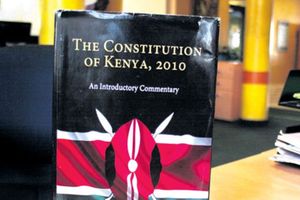
When family units break down, states are obligated to pick up the pieces
Is Kenya's developmental journey all about taxes, prices, inflation, employment numbers, the balance of trade and such complex macro-economic parameters?
Not necessarily.
Jesus was right when he said, "Man does not live on bread alone".
The sociology that underpins Kenyans must be part of our developmental endeavour. Political parties must have a sociological agenda on and above an economic one. Therefore, what social reforms do we need to undertake to help push Kenya forward?
One would start with appropriate policies on language, families and religions.
And there are historical antecedents. Many years back before current superpowers US and China, there were other very powerful nations. None of those is more important to us than the Roman Empire given its influence to date despite its decline and collapse.
For example, those of us called to be Christians should thank Roman Emperor Constantine. His act of recognition of Christianity as a state religion helped spread it.
Also, the democracy we now enjoy has Roman antecedents. The greatest Roman Emperor was Augustus who was an adopted son of Julius Caesar.
Peace and development
He reigned the longest and his reforms ushered in a period of peace and development. Emperor Augustus is famed for his ability to disguise power in order to keep the peace with the Senate (an earlier version of the modern-day Parliament).
But he is also known as the social reformer who embedded religious and family values. Within the modern secular context, family and religion are deemed personal choices outside the remit of state policy.
But when family units break down, states are obligated to pick up the pieces. Children uneducated by their parents (due to poverty or other breakdowns) must be cared for by the state otherwise they transition to tax-funded jails, hospitals or other rehabilitation centers.
And the most important institution that encourages families to stay together is religion. And, remember, they are not state-funded (although some European countries retain the church tax).
Research after research affirms that children from strong families have better life outcomes comparatively.
The "Two-parent privilege" by Melissa S. Kearney makes a data-driven case for marriage. It shows how marriage decline has led to a host of economic woes. When two adults marry, the book shows, their economic standards not only improve but do those of their offspring.
Well-educated upper class
Today, however, marriage is becoming mainly an institution for the well-educated upper class as opposed to every one. (This means others do not marry, of course, but at a lower rate and often their marriages have a high risk of collapse). And this has consequences — the children are not only impacted in terms of behavioural and educational outcomes but also negatively impact adult men.
Often, the man’s role in the workforce is intractably damaged and damages generations — with children from stable families begetting children whose life outcomes will be little better.
For example, America’s Black families are the most unstable and poorest. In contrast, Asians have the strongest families and are the most prosperous race in America.
From the foregoing, what can the Kenyan state do to promote family values without appearing to intrude into private realms?
There are subtle ways in which the state can introduce incentives for religions in pursuance of important secular goals. How about the faiths that build hospitals and schools be given some form of state support? These institutions help the state deliver on its mandate and core function, even if they do so with a profit motive. Then only can the state push forth a pro-family agenda.
Child neglect should also be punished severely. The state should tighten legislation on child support otherwise the number of street children will surge.
Further, greater support should be given to single parents. Often these carers are neglected by their partners, some of whom are financially able. They are left to do, single-handedly, what ought to be a couple’s job.
Those who neglect children should not be let roam free while those who stand by the innocent children are left to bear an unwieldy burden.
Financial resources
For those who chose the marriage route, that process should be made easier. Fees payable to the marriage registrar should most probably be abolished.
Family size should be purely the decision of individual parents and in particular, women.
The Bible states in Genesis that "go and fill the world but be able to handle it."
But this being an area where the law cannot do much in the way of direction, leaders and those who hold power should set the right social tone by leading through example.
The "Mpango wa Kando " phenomenon, where those who are blessed with financial resources keep multiple partners on the side, is merely a form of abuse of power.
Those who have money have more sexual partners while those without are left without.
It is mostly a few powerful men hogging all the beautiful ladies. And the females play along and make a rational decision to ignore their less financially-endowed peers.
A more equal society where young males can amass sufficient resources would send the right signals to encourage youngsters to couple up with their peers rather than cross-generational relationships.
Religions that foster secular goals like boosting education and health should receive state incentives. They should also be encouraged to fuse their religious teachings with important introductory educational courses, particularly in mathematics and languages.
For language, Kiswahili remains an important national language that fosters nationhood.
But English provides strategic importance to Kenya. It is an international language that weaves important knowledge. Probably the state should take more proactive steps to boost it across all regions and ages. It is also notable that learners who embrace English earlier comprehend other subjects better.
Dr Kang’ata is the Governor Murang’a County; Email [email protected].













